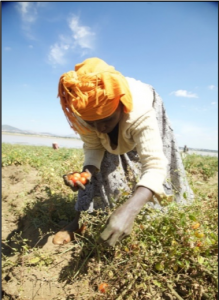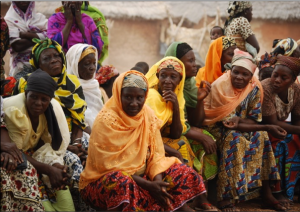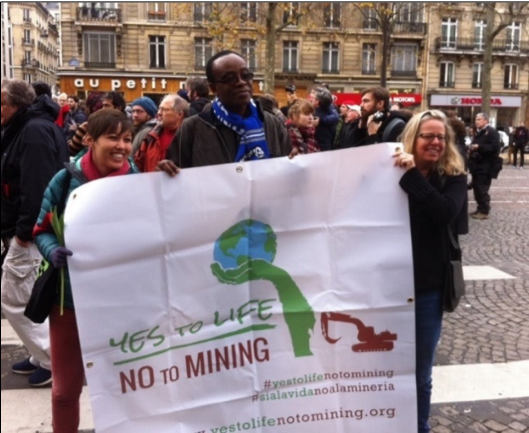First published on 02/29/2016, and last updated on 03/29/2018
By: Hannibal Rhoades, Gaia Foundation
If you’ve been following international media coverage of the climate change agreement recently signed into being by world governments in Paris, you could be forgiven for thinking the world has just taken a massive stride in the effort to tackle climate change and create a safer, more just world for all.
Nations used COP21 as a stage to play out arguably the biggest act of world diplomacy ever, winning huge political capital and public confidence in the process. But ultimately the deal they have struck is a hollow one in the only ways that really matter; namely the deal’s ability to prevent catastrophic climate change and to do so justly.

Woman farmer picking tomatoes, Ethiopia © Gaia Foundation
According to leading climatologist Kevin Anderson, Deputy Director of the Tyndall Centre for Climate Change Research, this deal is “weaker than Copenhagen,” the disastrous agreement of 2009, and “not in line with the latest science”.
“COP21 negotiators are looking at the Paris agreement with rose-stained glasses. The truth is that we have is a negotiated failure that has ignored sound science and justice,” says Enteng Bautista of Kalikasan PNE, Philippines, pointing out that the agreement doesn’t deliver socially either.
COP21 has been framed as a success, as we knew it would be. But, as with all agreements that are this ‘high level’, littered with technical jargon that renders them indecipherable to most people, the devil is in the detail…
In the new deal, the world’s governments have committed to peaking carbon emissions ‘as soon as possible’, and de-carbonising our societies worldwide ‘in the second half of this century’. But these same governments fail to call for binding climate action, give clear definitions of the action required and set all important deadlines for these efforts— deadlines that acknowledge Earth’s limits and that must be met if we wish to avoid enduring and inflicting untold suffering.
Around the planet indigenous peoples, local communities and the groups supporting them are taking action to combat climate change in ways that are socially just and ecologically sane. It is no coincidence that the territories of Indigenous Peoples are home to 80% of the world’s remaining biodiversity, including the forests that draw down vast quantities of carbon. Nor that small scale and peasant farmers around the world can feed themselves, their families and 70% of the world’s population from just 25% of the world’s farmland, largely without the use of fossil fuels and whilst sequestering carbon in healthy, life giving soils.

Resilience workshop, Zoosali, Ghana © Gaia Foundation
Yet it is precisely these peoples who are stripped of their rights and see their Earth-centred practices ignored by the Paris agreement. Mentions of human rights and Indigenous rights have been removed from the final deal. Previous drafts had included wording that would mean all solutions to climate change would have to be implemented with respect for these rights.
We need to understand that we have not been saved by the Paris deal. That is the first task we face- to cut through the media sensationalism and confront the reality, no matter how desperate we are for a success.
We must look to strengthen our movements to keep fossil fuels in the ground. From the snake-way of the Keystone XL pipeline in North America, to the lignite fields of Germany, to the lush highlands of the Philippines, communities and people’s movements everywhere are succeeding in doing this. But we need to win more often. We must find new ways to stand alongside frontline communities and defend Earth’s defenders so they can continue to live the solutions and to share them with the world. This is the big challenge for networks and movements like Yes to life, No to Mining, and we must rise to it.
We know that when there is the popular will, the grit, the determination, our nations can be encouraged do what is right. As Enteng Bautista reminds us, “Costa Rica has legislated a moratorium on fossil fuel exploration and mineral extraction. The island nation of Kiribati has proposed a global moratorium on coal. The Ogoni people of Nigeria have successfully kept oil companies out of their lands for years.”
At the deepest level of all, it is imperative that we pioneer new ways to put Earth back at the centre of our collective thinking. Unless we act from a deep understanding that the health and the future of humanity are deeply interwoven with that of our living planet, our solutions will continue to be co-opted into business-as-usual. Knowledge of our dependence on Mother Earth must be our anchor in the times ahead.
There is no one solution to climate crisis, no silver bullet. Nor can any one person, or government, or group of governments articulate an entire alternative system to our current one that is at war with people and planet. Rather, the systems change we want, and we so desperately need, will emerge from the actions of our societies’, bravest, most vibrant, resilient and determined groups, who are driven by a moral imperative that transcends current norms and augurs a better future. Ever was it thus. Our hope must be manifested in struggle.
Please find the entire text on this blog.
